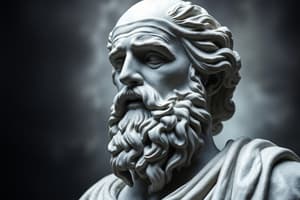Podcast
Questions and Answers
What are the two kinds of consciousness described?
What are the two kinds of consciousness described?
- Consciousness of oneself and one's psychological states
- Consciousness of oneself and sensations through experience (correct)
- Consciousness of external environment and social norms
- Consciousness through rational thought and intuition
What is required to organize information according to the content?
What is required to organize information according to the content?
- Apprehending in intuition, recognizing in concepts, and reproducing in imagination (correct)
- Analyzing data and formulating theories
- Recognition in memory and perception
- Emotional intelligence and social skills
Which philosopher is associated with the phrase ‘Cogito ergo sum’?
Which philosopher is associated with the phrase ‘Cogito ergo sum’?
- Rene Descartes (correct)
- Immanuel Kant
- David Hume
- Sigmund Freud
What does the content imply about Freud's view on the self?
What does the content imply about Freud's view on the self?
According to the concept of Mind-Body Dualism, which of the following is considered primarily responsible for personal identity?
According to the concept of Mind-Body Dualism, which of the following is considered primarily responsible for personal identity?
The content discusses a certain type of doubt described as hyperbolical or metaphysical. What does this refer to?
The content discusses a certain type of doubt described as hyperbolical or metaphysical. What does this refer to?
What plays a crucial role in connecting the thinking self with the physical self?
What plays a crucial role in connecting the thinking self with the physical self?
Which of the following best describes self-awareness according to the content?
Which of the following best describes self-awareness according to the content?
What is the first stage of self-development as described?
What is the first stage of self-development as described?
What characterizes a society focused on individualism?
What characterizes a society focused on individualism?
In the second stage of self-development, what concept allows children to understand social roles?
In the second stage of self-development, what concept allows children to understand social roles?
What does the term 'game' refer to in the context of self-development?
What does the term 'game' refer to in the context of self-development?
What does collectivism emphasize in a society?
What does collectivism emphasize in a society?
What is one of the two facets of the self according to George Simmel?
What is one of the two facets of the self according to George Simmel?
What does the term 'dynamism' describe in relation to self-development?
What does the term 'dynamism' describe in relation to self-development?
What defines a social group as per the content provided?
What defines a social group as per the content provided?
What describes the 'Organic Group' in terms of societal influence?
What describes the 'Organic Group' in terms of societal influence?
What is a characteristic of the 'Rational Group'?
What is a characteristic of the 'Rational Group'?
Which aspect of the self is emphasized in the 'Organic Group'?
Which aspect of the self is emphasized in the 'Organic Group'?
Which concept did Herbert Blumer coin?
Which concept did Herbert Blumer coin?
What primary motivation characterizes the 'Rational Group'?
What primary motivation characterizes the 'Rational Group'?
What is one of the core principles of Symbolic Interactionism?
What is one of the core principles of Symbolic Interactionism?
How do the 'Organic Group' and 'Rational Group' differ in terms of individual freedom?
How do the 'Organic Group' and 'Rational Group' differ in terms of individual freedom?
What is the social network in relation to an individual?
What is the social network in relation to an individual?
What are the three elements of the tripartite theory of the soul?
What are the three elements of the tripartite theory of the soul?
In the tripartite theory, which part is responsible for rational thought?
In the tripartite theory, which part is responsible for rational thought?
According to the content, what is the role of appetite in the tripartite soul?
According to the content, what is the role of appetite in the tripartite soul?
What does the 'Will' in the tripartite nature of the self refer to?
What does the 'Will' in the tripartite nature of the self refer to?
How is personal identity connected to memory?
How is personal identity connected to memory?
What philosophical concept does John Locke's 'Tabula Rasa' describe?
What philosophical concept does John Locke's 'Tabula Rasa' describe?
According to the content, what is necessary for a unified self-identity?
According to the content, what is necessary for a unified self-identity?
What concept indicates that knowledge is derived from both experience and reason?
What concept indicates that knowledge is derived from both experience and reason?
What is the defining characteristic of the human self according to Thomas Aquinas?
What is the defining characteristic of the human self according to Thomas Aquinas?
What does the theory of self-knowledge propose regarding an individual's understanding of themselves?
What does the theory of self-knowledge propose regarding an individual's understanding of themselves?
What is considered the ultimate goal of life according to Thomas Aquinas?
What is considered the ultimate goal of life according to Thomas Aquinas?
What is the role of the Socratic method in self-examination?
What is the role of the Socratic method in self-examination?
According to Plato, what are the two realms that shape human understanding?
According to Plato, what are the two realms that shape human understanding?
How does St. Augustine categorize the realms of experience?
How does St. Augustine categorize the realms of experience?
What are the four cardinal virtues identified in Aquinas' teachings?
What are the four cardinal virtues identified in Aquinas' teachings?
What is the problem of self-opacity as described in the context of self-knowledge?
What is the problem of self-opacity as described in the context of self-knowledge?
Flashcards are hidden until you start studying
Study Notes
Thomas Aquinas (1225-1274)
- Theory of Self-Knowledge: Knowledge of self is dependent on worldly experiences.
- Physical Body: Visible, changing, imperfect, and mortal.
- Ideal Realm: Immortal soul, unchanging, survives bodily death.
- Distinction between natural reason and divine revelation; reason is central to human identity.
- Self-examination enables access to virtue and knowledge.
- The goal of life: Self-knowledge and virtuous living for soul improvement.
- Three theological virtues: Faith, hope, charity.
- Socratic method fosters dialogue between soul and self to discover truths.
- Aim for eternal union and fellowship with God.
Plato (428-347 BC)
- Introduced concept of two realms: world of Forms (non-physical) and world of Senses (physical reality).
- Emphasized soul's distinctness from the body; body-soul unity is essential for completeness.
- Two realms according to St. Augustine: intelligible and sensible realms.
St. Augustine (354-430 BC)
- Described the soul as tripartite: reason (logos), spirit (thumos), and appetite (epithumia).
- Believed humankind is created in God's image; free will exists in humans.
- Original sin introduces inherent sinfulness in humanity.
- The self is primarily known through knowing God; self exists within the bounds of time and mortality.
- Tripartite nature of the self: Memory, Intellect, Will, influencing personal history and self-awareness.
John Locke (1632-1704)
- Introduced Tabula Rasa: Mind is a blank slate at birth; knowledge is gained from experience.
- Emphasized the importance of direct sensory experience in knowledge acquisition.
- Personal identity closely tied to memory; consciousness is vital for unified identity across time.
Francis Bacon (1561-1626)
- Asserted that knowledge is power and comes from studying nature to understand its forces.
- Introduced the concept of accountability tied to knowledge and social elements.
- Categorized synthesis needed for information organization into three types: intuition, concept recognition, and imagination.
Rene Descartes (1596-1650)
- Advocated for methodological skepticism: doubt everything at least once for truth discovery.
- Famous quote "Cogito ergo sum" establishes self-existence through thought.
- Believed in Mind-Body Dualism; self combines mind and physical extension.
- Self-awareness is foundational for knowledge and connects physical self with thought.
Sigmund Freud (1856-1939)
- Introduced multitiered self: conscious, subconscious, and unconscious.
- Stressed the unconscious self's influence over conscious rational thought.
- Suggested defense mechanisms protect self from reality; self-identity is tied to self-consciousness.
Notable Theoretical Constructs
- Topographical Theory of the Human Mind: Differentiation of conscious versus unconscious mental processes.
- Stages of Self-Development:
- Stage 1: Imitation (copying others without full understanding).
- Stage 2: Play (taking roles to understand social expectations).
- Stage 3: Game (considering multiple roles simultaneously, understanding societal rules).
Individualism vs. Collectivism
- Individualism: Loose societal ties; emphasis on personal self-reliance and freedom.
- Collectivism: Strong social systems where groups protect members in exchange for loyalty.
George Herbert Mead and Symbolic Interactionism
- Defined two facets of self: "I" (spontaneous, creative) and "Me" (socialized, shaped by norms).
- Proposed three core principles in symbolic interaction: significance of meaning, role of language, and importance of thought.
- Interaction shapes self through shared experiences leading to meanings.
Studying That Suits You
Use AI to generate personalized quizzes and flashcards to suit your learning preferences.




